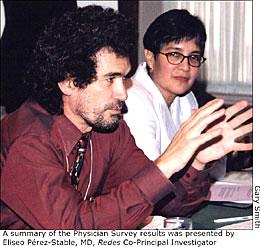
December 18, 2002
A lack of consensus exists among physicians, particularly Latinos, that clinical trials are good for their patients. That was among the findings of a nationwide Redes En Acción survey of Latino and primarily non-Hispanic white family physicians comparing attitudes and practices regarding cancer.
Among the physicians surveyed, only 53 percent of Latinos and 63 percent of non-Hispanic whites agreed that sufficient scientific value and benefits exist for them to refer patients to clinical trials. Forty-three percent of Latino respondents and 32 percent of non-Hispanic whites reported that they had never participated in clinical trials.
- A summary of survey results was presented at the 3rd Annual Redes En Acción National Steering Committee Meeting by Eliseo Pérez-Stable, MD, Co-Principal Investigator of the Redes Northwest Regional Network Center.
- Of the 2,000 surveys mailed, completed responses were returned by 744 physicians - 304 Latinos and 440 others. The target audience, drawn from the American Medical Association master file, included internal medicine (40%), family medicine (40%) and gynecology (20%) specialists from California, Texas, New York, New Jersey, Florida and Illinois.
The questionnaires sought information about demographics, medical background, type of patients and language use in their practices, smoking cessation treatments, cancer screening practices, genetic testing and clinical trials.
What Is Redes En Acción? Redes En Acción is a major NCI-supported initiative to combat cancer among Latinos through a nationwide network of community-based organizations, research institutions, government health agencies and the public. Core activities include promoting cancer training and research opportunities for Latino students and researchers, generating research projects on key Latino cancer issues, and supporting cancer awareness activities within the Latino community.
The initiative is coordinated by the Baylor College of Medicine in Houston and San Antonio, with regional network centers in San Antonio, New York, Miami, Chicago, San Francisco and San Diego.



